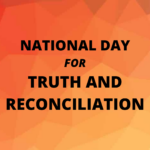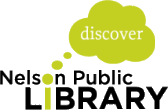 In 2021, the unmarked mass grave of 215 Indigenous children was discovered at the site of a Residential School in Kamloops. In the months that followed, this discovery brought new attention to the work of the Truth and Reconciliation Commission, the aim of which was to listen to the stories of the Residential School Survivors and acknowledge these voices. More graves would be discovered across Canada, and more voices were given space in the media to be heard.
In 2021, the unmarked mass grave of 215 Indigenous children was discovered at the site of a Residential School in Kamloops. In the months that followed, this discovery brought new attention to the work of the Truth and Reconciliation Commission, the aim of which was to listen to the stories of the Residential School Survivors and acknowledge these voices. More graves would be discovered across Canada, and more voices were given space in the media to be heard.
One of the recommendations from the Commission was to create a National Day for Truth and Reconciliation, as a day to reflect on and learn about the impact of residential school systems in Canada. In June of 2021, that day was declared to be recognized annually on September 30th by the federal government. The province of B.C. will also be recognizing this day: “Our government is calling on all of us who deliver services to the public to use this opportunity to consider what each of us can do as individuals to advance reconciliation with Indigenous peoples and to recommit to understanding the truth of our shared history, to accept and learn from it and in doing so, help to create a better, more inclusive British Columbia.”
Since 2013, September 30th has been known as Orange Shirt Day after the story shared by Residential School survivor Phyllis Jack Webstad, about her orange shirt being taken away when arriving at the school. This has become a symbol about how the identities of Indigenous children were stripped away with the goal of assimilation and the erasure of Indigenous culture. Please click the video link to hear her story.
Phyllis Webstad explains the story of her experience at Residential School and the origination of Orange Shirt Day in Canada. She discusses the present situation and her hopes for the future. (Orange Shirt Society, YouTube channel.)
Ktunaxa Nation Statement on Reconciliation, and this portion created by a group of Elders, the Traditional Knowledge and Language Advisory Committee:
n̓ini ku qaɬwiynaɬa
[this is what is in our hearts].
qaqaʔni ma yaqaɬitknawaski
[what they did to us is true].
q̓apiɬpaɬnin
[say it all/tell the whole story].
mika yaqaɬitknawaski hu qayaqaɬqaȼaɬani
[despite what happened to us we made it through].
hu qaɬwinaɬani kuȼ sukiɬ ʔaqsɬmaknik̓ naɬa
[we want a good life for ourselves].
hawiȼkinin kȼmak̓ kyam ȼ ȼina·kinin
[hold the truth and go forward].
ȼinɬ qaqa [so be it]. maʔȼ kuktkinin!
[do not change this statement!]
Learning resources for settlers and guests on this land:
- Learn More: National Day of Truth & Reconciliation, September 30 (ictinc.ca)
- Nelson Library page: Indigenous Peoples.
- Ktunaxa Nation Statement on Reconciliation.
- Teacher’s Resources for Orange Shirt Day.
- National Centre for Truth and Reconciliation – Week of Truth and Reconciliation
Support resources for those who endured the Residential School system
We would like to acknowledge that the land on which we gather is the traditional territory of the Sinixt, the Ktunaxa, and the Syilx peoples, and is home to the Métis and many diverse Indigenous persons. We honour their connection to the land and rivers and respect the importance of the environment to our strength as a community.
